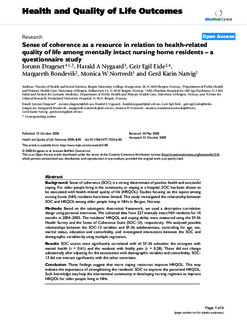| dc.contributor.author | Drageset, Jorunn | |
| dc.contributor.author | Nygaard, Harald A. | |
| dc.contributor.author | Eide, Geir Egil | |
| dc.contributor.author | Bondevik, Margareth | |
| dc.contributor.author | Nortvedt, Monica W. | |
| dc.contributor.author | Natvig, Gerd Karin | |
| dc.date.accessioned | 2018-02-01T15:08:23Z | |
| dc.date.available | 2018-02-01T15:08:23Z | |
| dc.date.issued | 2008-10-21 | |
| dc.identifier.citation | doi:10.1186/1477-7525-6-85 | en_US |
| dc.identifier.issn | 1477-7525 | |
| dc.identifier.uri | http://hdl.handle.net/11250/2481764 | |
| dc.description.abstract | Background Sense of coherence (SOC) is a strong determinant of positive health and successful coping. For older people living in the community or staying in a hospital, SOC has been shown to be associated with health-related quality of life (HRQOL). Studies focusing on this aspect among nursing home (NH) residents have been limited. This study investigated the relationship between SOC and HRQOL among older people living in NHs in Bergen, Norway. Methods Based on the salutogenic theoretical framework, we used a descriptive correlation design using personal interviews. We collected data from 227 mentally intact NH residents for 14 months in 2004–2005. The residents' HRQOL and coping ability were measured using the SF-36 Health Survey and the Sense of Coherence Scale (SOC-13), respectively. We analyzed possible relationships between the SOC-13 variables and SF-36 subdimensions, controlling for age, sex, marital status, education and comorbidity, and investigated interactions between the SOC and demographic variables by using multiple regression. Results SOC scores were significantly correlated with all SF-36 subscales: the strongest with mental health (r = 0.61) and the weakest with bodily pain (r = 0.28). These did not change substantially after adjusting for the associations with demographic variables and comorbidity. SOC-13 did not interact significantly with the other covariates. Conclusion These findings suggest that more coping resources improve HRQOL. This may indicate the importance of strengthening the residents' SOC to improve the perceived HRQOL. Such knowledge may help the international community in developing nursing regimens to improve HRQOL for older people living in NHs. | en_US |
| dc.language.iso | eng | en_US |
| dc.publisher | BioMed Central | en_US |
| dc.relation.ispartofseries | Health and Quality of Life Outcomes | en_US |
| dc.relation.ispartofseries | 2008, 6:85 | en_US |
| dc.subject.other | sense of coherence | en_US |
| dc.subject.other | nursing homes | en_US |
| dc.subject.other | quality of life | en_US |
| dc.title | Sense of coherence as a resource in relation to health-related quality of life among mentally intact nursing home residents – a questionnaire study | en_US |
| dc.type | Peer reviewed | en_US |
| dc.type | Journal article | en_US |
| dc.subject.nsi | VDP::Medisinske Fag: 700::Helsefag: 800::Sykepleievitenskap: 808 | en_US |
